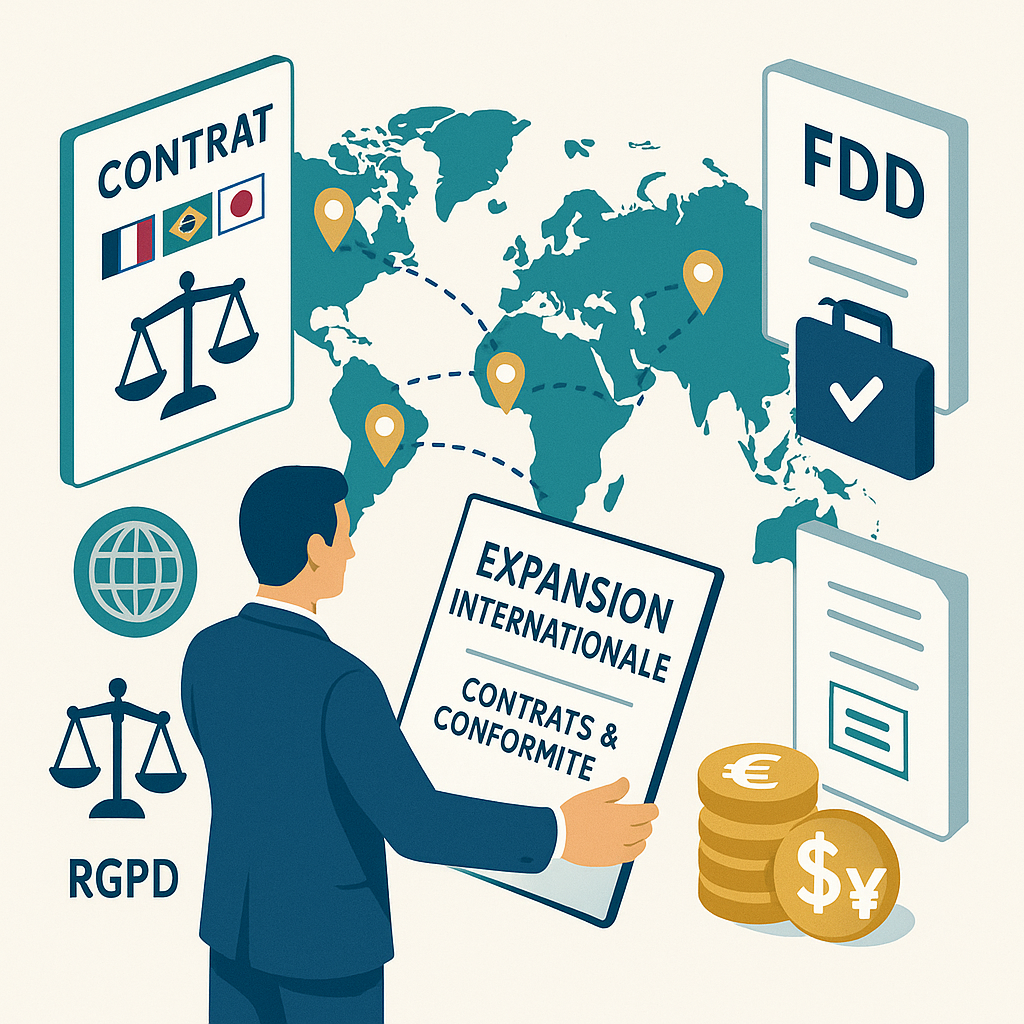Internationalizing your franchise network is the natural outcome for a franchise network. Check out this complete guide!
International expansion is often the natural outcome for a franchise network that has proven itself in its home market. While this cross-border ambition opens up considerable growth prospects, it also brings with it major legal challenges that require careful preparation.
This comprehensive guide takes you through this complex but potentially rewarding adventure.
If you need a franchise lawyer, contact me!
The legal challenges of international expansion
The internationalization of a franchise involves much more than simply transposing your business model to a new territory. It involves a thorough overhaul of your legal structure to adapt it to local legal realities, while preserving the essence of your concept.
The first difficulty lies in the heterogeneity of regulatory frameworks governing franchising around the world. Unlike the European Union, which offers a certain degree of harmonization, international legislation is fundamentally divergent. Some countries, such as the United States with its "Franchise Rule" or China with its "Commercial Franchise Administration Regulation", have very strict specific laws regulating franchising. Other territories have not developed dedicated legislation and apply their common contract law, creating legal uncertainty that needs to be anticipated.
Intellectual property, the cornerstone of your franchise system, is subject to varying degrees of protection in different jurisdictions. Despite the existence of international conventions such as the Madrid Convention for trademarks, the effectiveness of this protection differs considerably from one country to another. In some regions, counterfeiting and unauthorized use of your intellectual property can represent a serious threat, against which local remedies may be limited.
Pre-contractual transparency requirements are another major obstacle. The level of information you must provide to potential franchisees varies considerably: highly formalized in the USA with the Franchise Disclosure Document (FDD), less structured but just as restrictive in France with the Document d'Information Précontractuelle (DIP), virtually non-existent in certain emerging countries. This disparity makes it difficult to standardize your recruitment processes, and requires fine-tuning for each market.
Legislative differences between countries: a comparative analysis
Europe: a legal mosaic despite the Union
Even within the European Union, legal approaches to franchising differ significantly. France imposes a strict pre-contractual formalism, with the delivery of a DIP at least 20 days before the signing of the contract, as well as a reinforced information obligation. Germany, although it has no specific legislation on franchising, rigorously applies the principles of its law on restrictions of competition. Italy adopted a specific law in 2004, requiring a written contract with detailed mandatory clauses.
Despite the apparent unity of the common market, these differences mean that your legal documentation needs to be finely tuned for each European country. The European Block Exemption Regulation applicable to vertical agreements nevertheless offers a common framework for certain aspects of the contract, notably concerning territorial restrictions and exclusive supply clauses.
The Americas: between increased protection and contractual liberalism
The United States probably has the world's most developed legal framework for franchising, with federal regulations (the FTC Franchise Rule) supplemented by specific laws in many states. California, New York and Illinois are particularly demanding, requiring prior registration of your franchise documentation with local authorities. Canada presents a similar situation, with provinces such as Ontario and Alberta boasting specific laws that are highly protective of franchisees.
Conversely, Latin America generally offers a less standardized environment. Mexico, despite its economic integration with the United States, has no franchise-specific legislation, but does require the registration of contracts containing technology transfers. Brazil has incorporated provisions relating to franchising into its industrial property code, with a more flexible approach than its North American neighbors.
Asia-Pacific: increased vigilance over intellectual property
China, a colossal market for international franchisors, has considerably strengthened its legal framework, with regulations requiring franchisors to have successfully operated at least two establishments for more than a year before expanding their network. The issue of intellectual property remains particularly sensitive, requiring specific local registrations to guarantee effective protection.
Australia and New Zealand have developed mandatory codes of conduct for franchisors, imposing particularly detailed pre-contractual information obligations. Japan, although it has no specific legislation, rigorously applies its antitrust laws to franchise relationships, creating a subtle legal environment to master.
Necessary adaptations to the DIP and franchise agreement
Faced with this regulatory diversity, your Pre-contractual Information Document and your franchise contract need to be thoroughly adapted for each target market. This legal customization is not limited to a simple translation, but involves a genuine transposition that takes account of local specificities.
With regard to the DIP, the financial information to be provided varies considerably from one jurisdiction to another. In the USA, you'll need to include very detailed financial projections, as well as a performance history of your existing units. In France, although financial forecasts are not mandatory, case law tends to penalize franchisors who provide misleading market studies. In other countries, the absence of a formal obligation does not exempt you from a general duty of good faith, which can be interpreted widely by local courts.
The territorial clauses of your contract will require particular attention. Territorial exclusivities, common in many franchise systems, are strictly governed by European competition law, but can be more freely negotiated in other regions. Conversely, some countries impose minimum territorial protections that you cannot contractually circumvent.
The duration of the contract and the conditions for its renewal are another major point of adaptation. Some jurisdictions, such as Australia, impose minimum terms to guarantee franchisees a reasonable return on their investment. Others, like some American states, strictly regulate non-renewal conditions to protect established franchisees.
Post-contractual non-competition clauses, often essential to protect your concept, are subject to extremely variable legal regimes. Widely accepted in Europe under certain conditions of proportionality, they are sometimes considered unenforceable in certain American states such as California, or subject to mandatory financial compensation in certain Asian countries.
A franchise lawyer with an international network will be able to guide you effectively through this complex contractual adaptation, based on in-depth knowledge of local specificities and recent case law developments in each target country.
International intellectual property protection
Your brand, know-how and other intangible assets are at the heart of your franchise system. Protecting them internationally requires a proactive, differentiated strategy for each target territory.
Pre-registration of your trademark in each target country is a fundamental and non-negotiable step. Despite the existence of international registration systems such as the Madrid System, which enables you to file a single application for several countries, effective protection remains subject to national legislation. In some countries, such as China, the "first to file" principle prevails over the "first to use" principle, making early registration crucial, ideally even before discussions with local partners.
Protecting your know-how poses particular challenges internationally. Unlike trademarks, there is no dedicated registration system for know-how. Its protection relies mainly on contractual arrangements (confidentiality and non-competition clauses), the effectiveness of which varies considerably from one jurisdiction to another. In some countries, notably in South-East Asia, the effectiveness of remedies in the event of infringement may be limited, despite robust contractual provisions.
Your operational manuals, the bible of your concept, also need to be properly protected. In addition to language translations, they may need to be adapted to local standards and practices, while preserving the essential elements of your concept. The legal status of these documents varies from country to country: in Europe, they are considered works protected by copyright, while elsewhere they may be subject to other legal regimes.
Managing the local development of your concept is another major challenge. Your international franchisees will inevitably develop adaptations and innovations to meet the specific needs of their market. Your contract must clearly establish the ownership of these developments, and provide mechanisms for their eventual integration into your global system, taking into account the particularities of local intellectual property law.
Optimal legal structures for internationalization
The choice of legal structure for your international expansion depends on many factors, including tax, operational and strategic considerations. There are several models to choose from, each with its own advantages and disadvantages.
International direct franchising
This approach involves signing franchise agreements directly between your parent company and local franchisees in each country. Simple and inexpensive to set up, it nevertheless has major drawbacks: direct exposure to local legal risks, difficulties with remote control and support, tax complexities with cross-border financial flows. This structure is best suited to first-time operations in countries that are culturally and legally close to your home market.
Master franchise
A master franchise agreement is often the preferred solution for ambitious international expansion. You grant a local partner the right to develop your concept in a defined territory, usually an entire country, by recruiting and supporting franchisees. This partner, the master franchisee, acts as an intermediary with in-depth knowledge of the local market and its specific legal requirements.
This structure offers a number of advantages: it limits legal risks, the master franchisee's knowledge of the local market speeds development, and simplifies financial flows. It does, however, present challenges, particularly in terms of selecting the right partner and defining respective obligations in the master franchise agreement. The content and level of detail of the DIP transmitted to the master franchisee vary considerably from one jurisdiction to another, and require fine-tuning.
The local franchise subsidiary
The creation of a local subsidiary in each target country, which will itself act as franchisor, represents the most controlled but also the most costly option. This structure gives you full control over the development of your network and enables you to adapt perfectly to local conditions. It does, however, generate substantial fixed costs, and requires in-depth knowledge of the local market or the recruitment of competent local teams.
This approach is particularly appropriate for strategic markets with high potential, or with complex legal features requiring a local presence. It involves setting up licensing agreements between your main entity and its subsidiary for the use of intellectual property, with the tax issues associated with transfer pricing.
Franchise joint ventures
An interesting intermediate option is to set up a joint entity with a local partner, who will become the franchisor in the territory concerned. It combines the partner's local expertise with your mastery of the concept, while sharing investments and risks. This structure is particularly well suited to markets that are difficult to access or highly regulated, such as certain Asian or Middle Eastern countries.
Drafting the shareholders' agreement for this joint venture is of paramount importance, particularly with regard to governance, respective contributions (particularly the valuation of your intangible assets), and exit conditions. Careful planning is also required for tax aspects, particularly with regard to the payment of royalties and dividends.
Strategies for cultural and commercial adaptation
Beyond the purely legal aspects, the success of your internationalization largely depends on your ability to adapt your concept to local cultural and commercial realities, while preserving its essence. This adaptation needs to be carefully framed in contractual terms.
The balance between global standardization and local adaptation is a major challenge. Your international contract must clearly distinguish between the non-negotiable elements of your concept (generally linked to your brand image and core processes) and the aspects that can be adapted to local specificities. This distinction must be explicitly formulated to avoid any drift that could dilute your concept.
Adaptations of your commercial offer to local preferences and customs must be contractually agreed. Certain markets may require substantial modifications to your product or service range. Such adaptations must be governed by clear approval processes and objective criteria to ensure the overall coherence of your network.
Marketing communications are particularly sensitive to cultural variations. Your internationalization strategy must include mechanisms for validating local adaptations of your advertising campaigns, taking into account the specific legal constraints on advertising in each country.
Differences in common business practices may also require adjustments. Opening hours, preferred payment methods, or customer service expectations vary considerably between cultures. Your international operational documentation needs to incorporate these variables while maintaining a consistent standard of quality.
The tax and financial challenges of international expansion
The internationalization of your network raises complex tax and financial issues that need to be anticipated to avoid costly surprises.
The structuring of your cross-border financial flows deserves particular attention. Royalties paid by your foreign franchisees or masters are generally subject to withholding taxes, the rates of which vary considerably according to the bilateral tax treaties in force. Prior tax planning can enable you to legally optimize these flows using the most appropriate legal structures.
The problem of transfer pricing is particularly acute for groups using local subsidiaries. Tax authorities closely monitor royalties paid between entities of the same group, to ensure that they correspond to the economic reality of the services and rights granted. Rigorous documentation justifying your international royalty scales is essential.
Currency management represents another major challenge, particularly for networks extending into countries with high currency volatility. Your international contract must include mechanisms for indexing or adjusting royalties to preserve the economic equilibrium of your relationship over the long term, while complying with sometimes restrictive local regulations on payments in foreign currencies.
Banking and repatriation of funds also deserve special attention. Some countries impose restrictions on international transfers or prior authorization procedures that can considerably complicate the transfer of your royalties. These constraints must be anticipated right from the structuring phase of your expansion.
Efficiently prepare your international expansion
Faced with the complex legal challenges of internationalization, you need a structured methodology to maximize your chances of success.
The first step is to carry out a complete audit of your concept and its current legal documentation. This assessment will enable you to identify the fundamental elements of your system that must be preserved, and those that can be adapted locally. This exercise will also help you anticipate the main difficulties of legal transposition in different regulatory environments.
Prioritizing your target markets according to their commercial potential and legal accessibility is an essential step. Some countries, despite their undeniable economic appeal, may present regulatory barriers to such an extent that a gradual entry, after consolidating your presence in more accessible markets, will prove more judicious.
Building a multi-disciplinary team dedicated to your international expansion is a key success factor. Ideally, this team should combine legal, financial, operational and intercultural skills, either in-house or via specialized external partners. The complexity of international issues makes it illusory for this expansion to be managed by a single person or a generalist legal department.
A permanent international legal watch is essential to anticipate regulatory changes that could impact your development. This watch must cover not only legislation specific to franchising, but also related fields such as competition law, consumer protection and intellectual property.
The complexity of international development requires the expertise of a lawyer who masters the subtleties of foreign legislation while preserving the integrity of your concept. This legal partner will help you develop a secure expansion strategy tailored to your international ambitions.
Building sustainable international success
The internationalization of a franchise network represents a major but potentially highly rewarding challenge for ambitious franchisors. This complex adventure requires meticulous legal preparation, cultural and commercial adaptability, and a clear strategic vision.
Networks that successfully expand internationally are generally distinguished by their ability to maintain a subtle balance between global standardization and local adaptation. They develop legal expertise specific to each market while preserving the overall coherence of their concept, thus creating a truly international yet locally relevant brand.
Your international success will largely depend on the quality of your local partners and the solidity of your legal foundations. A substantial initial investment in the legal structuring of your expansion will protect you against costly risks and enable you to build a harmonious and sustainable international development.
By methodically tackling the legal challenges of internationalization, you'll transform your domestic franchise into a global business capable of thriving in diverse cultural and regulatory environments, opening up new horizons of growth for your concept and brand.




